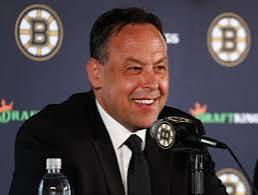
The Unlikely Journey of William Moore: From Tiny Keys to NHL Dreams
When William Moore envisions his future—his upcoming transition to Boston College, and what passions he might seriously pursue—music quickly exits the equation. Despite his remarkable talent and accomplishments in piano, it’s not something he sees himself majoring in. In fact, he doesn’t think that studying piano in college would be a genuine challenge.

“I’m still not sure what I’ll study,” Moore admitted. “But I doubt it’ll be piano. It just wouldn’t feel right. I’d rather pick something that I actually have to work at to master.”
This isn’t to say Moore’s relationship with music is over. Far from it. Recently, he’s felt a bit burnt out from classical pieces—the very genre that defined much of his early years—and has shifted toward more contemporary selections, like film scores and pop music. It’s less about competition now and more about enjoyment.
“I learned to play the ‘Interstellar’ soundtrack,” Moore said of Hans Zimmer’s iconic score. “That was a fun one.”
Moore, who was selected 51st overall in the second round of the 2025 NHL Draft by the Boston Bruins, has walked a path shaped by two immense passions: the piano, which he began playing at the almost unbelievable age of two, and hockey, a sport he fell for against the odds. By age 10, he was performing in the hallowed halls of Carnegie Hall, thanks to his prize-winning performance of Chopin’s Polonaise in G Minor in the Little Mozarts International Competition. Now, at 18, he stands on the edge of a new chapter in life, preparing to join Boston College and begin the journey toward his ultimate goal—becoming a mainstay for the Boston Bruins in the NHL.
But none of it was planned.
A Twist of Fate in Canada
“It’s kind of crazy to look back on,” Moore reflected. “If my mom had been pregnant just one month later, we might’ve been back in Europe. I might’ve grown up somewhere totally different, playing soccer or another sport. I’m really glad things turned out the way they did.”
Moore’s early life was steeped in soccer—at least, it was supposed to be. His mother, Vanusa, a native of Brazil, naturally expected her son to embrace the sport that’s beloved in her homeland. At birth, he was adorned with multiple soccer jerseys, including at least one Brazilian national kit.
Naturally, he was signed up for soccer at a local community center. But that center shared space with a hockey rink, and young William was far more captivated by the speed and chaos on the ice than the ball at his feet. So often did he abandon his soccer practices to stare at the hockey players that his mother joined the coaching staff—just to keep tabs on him and prevent him from running off.
“He just kept leaving,” Vanusa said with a laugh. “He was maybe three years old, and he’d always say, ‘I want to play that,’ pointing to the hockey rink. And we’d have to coax him back: ‘No, sweetie, let’s go back to soccer.’ It happened every time.”
He also wasn’t interested in skiing, the sport his father loved growing up. Eventually, the family gave in. If hockey was what William was passionate about, then hockey it would be.
But even that choice was unlikely—if not for a serendipitous move to the Greater Toronto Area, the sport might never have entered Moore’s life at all.
The Canadian Detour That Changed Everything
The Moore family had been temporarily assigned to Canada for work and were considering returning to Switzerland when Vanusa discovered she was pregnant. She began experiencing nausea and assumed she had developed a strange allergy to Tim Horton’s—the smell alone made her sick.
“I went to the doctor thinking maybe I was allergic to coffee or something,” Vanusa recalled. “But no. I was pregnant.”
Relocating with a newborn or moving while dealing with severe pregnancy symptoms seemed overwhelming. So, they stayed. And as they settled into Mississauga—a city that reminded them of Geneva—they began to call it home.
It was there, in the icy rinks of Ontario, that William’s love for hockey took root. He was just six when he began training seriously, under coach Chris Stevenson. It wasn’t long before Stevenson saw something special in him.
“I’m usually hesitant about having young kids play above their age level,” Stevenson explained. “But with William, it was a no-brainer. From the beginning, he was polite, coachable, and locked in. You could push him, and he’d respond positively every time.”
Stevenson remembered one telling moment when Moore was 12. The coach was walking the team through a particular system and Moore stopped him with a polite but pointed observation.
“Coach, that’s not what you usually tell us,” Moore said.
That brief interruption made a lasting impression on Stevenson.
“It showed how closely he was paying attention,” Stevenson said. “Most kids just nod and go along. William listened, remembered, and wasn’t afraid to question something that didn’t add up.”
From Prodigy to Prospect
As he developed on the ice, Moore’s drive became more intense. He had long-running friendly competition with Michael Misa—another top-tier player and the No. 2 overall pick in the 2025 draft by the San Jose Sharks. They’d go back and forth as the best on their team. When early projections suggested Moore could be a first-round pick, he didn’t get complacent. Instead, he doubled down, determined to outshine those ranked ahead of him.
“That’s just how he is,” Stevenson said. “He thrives when he has something to prove. I think getting picked in the second round will only fuel him more. When he’s motivated, his ceiling is unlimited.”
Though Moore isn’t considered a “can’t-miss” prospect like Misa, his upside is undeniable. Physically, he still has growing to do, and his overall game needs refinement. That’s where Boston College—and its development program—comes in. With five other Bruins prospects also joining the BC squad, including standout James Hagens, Moore will be surrounded by elite talent and resources.
“He’s got all the tools,” said Bruins GM Don Sweeney. “His skating, vision, hockey IQ—it’s all there. He just needs to mature physically and round out his game. College will be a great test and a great opportunity for him.”
A Musical Mind in a Physical Game
When NHL teams scout prospects, they often ask about interests outside hockey. Many players list hobbies like video games or casual music. Some dabble with instruments. But Moore? His talent in music stood out in a major way.
“He’s not just a kid who plays piano on the side,” Sweeney said. “He’s incredible at it. Legitimately gifted.”
Moore’s musical journey began with a fascination for the keyboard in his family’s home. Even before he could fully reach the keys, he could replicate notes. Recognizing his natural ability, his parents searched until they found a teacher willing to take on a student so young.
“He just got it,” Vanusa said. “We’d play a tune, and he’d figure it out. Piano came naturally to him.”
By four, he had added the violin to his repertoire. Moore says he has always been enchanted by music, especially by how it sounds and how it’s constructed.
“I just love how it feels in my ears,” Moore said. “When I listen to a song, I hear the layers, the details, the production. It’s fascinating. And honestly, that kind of appreciation keeps me going every day.”
He saw piano as something that came easily—unlike hockey, which required hours of practice, effort, and development.
“I didn’t have to work at piano like I did with hockey,” he said. “My parents were always on me for not practicing enough, but I loved hockey more. That was where I wanted to push myself.”
He studied piano seriously until age 16, at which point he left for the U.S. National Team Development Program, where his dual citizenship (through his mother) allowed him to play. But in that environment, music education wasn’t on the menu.
“They just don’t have anything like that there,” he explained.
Overcoming the Silent Challenge
There’s another part of Moore’s story—one he doesn’t dwell on. As a child, he suffered from a serious ear infection that affected his hearing. His mother remembers it clearly, even if he doesn’t.
It was a schoolteacher who noticed something off—Moore didn’t respond when spoken to from behind. That led to a doctor’s visit, where large lymph nodes were discovered. The family feared the worst.
“SickKids Hospital only takes really serious cases,” Vanusa said. “We were terrified. Cancer, infections—we didn’t know what it was.”
Eventually, specialists determined that Moore had a dangerous ear infection that was worsening with time and affecting his hearing. It had gone unnoticed because he had adapted, developing ways to communicate and function without fully understanding sound.
Surgery was necessary.
“He had to work so much harder to process sound,” Vanusa said. “After surgery, it was like he was in a whole new world. Even simple things like flushing a toilet overwhelmed him.”
But the adjustment period passed, and Moore returned to focusing on what he loved—music and hockey. Today, he brushes off that chapter. It’s not something he sees as an obstacle or a defining challenge. He’s focused on the future.
What Comes Next
Moore is now preparing for the next phase of his life at Boston College. He’s driven by a clear goal: to become a difference-maker on the ice.
“I’m a big guy, but I bring a creative offensive game,” he said. “I think my biggest strength is my hockey IQ and making the players around me better. I have good hands, vision, and I think I can bring some serious offense to the table.”
It’s been an incredible journey—from a toddler fascinated by piano keys to a teenager preparing to step into the world of college hockey and eventually the NHL. Through it all, Moore has followed his instincts, his curiosity, and his ambition, choosing paths that surprised even his own parents.
“He just keeps rising,” Stevenson said. “Give him a chance, and he’ll take it. His potential? It’s limitless.”
Leave a Reply